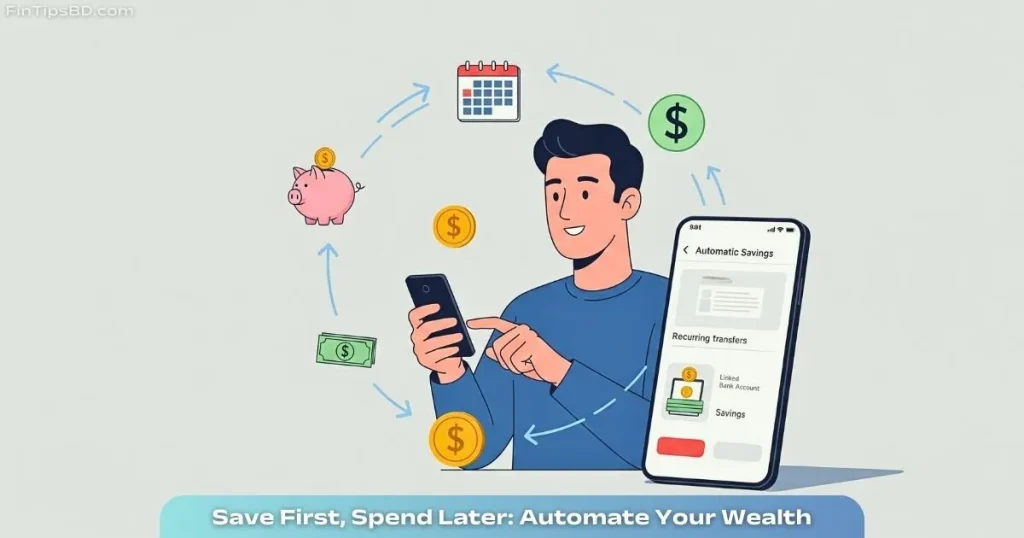Top 10 Personal Finance Skills That Can Instantly Improve Your Bank Account

Personal finance skills form the backbone of a stable and low-stress financial life. Whether you’re earning regularly or just starting out, being able to handle your money wisely can be the difference between ongoing financial worry and achieving lasting financial independence. This all-in-one guide breaks down the 10 most crucial personal finance skills that can quickly boost your money management, cut out needless spending, and help you grow your wealth—starting right now.
Sadly, many people go through life without ever picking up these vital personal finance skills. The outcome? Rising debt, missed opportunities to save, and a general feeling of losing control over their finances. By learning and applying these key habits, you’ll build the confidence and ability to manage your money journey effectively.
Table Of Contents
1. Budgeting: The Habit That Builds Control
Budgeting isn’t just about trimming costs—it’s about understanding exactly where your cash is going and making thoughtful choices with it. Without a proper plan, overspending becomes easy and often unnoticed. A solid budget helps you focus on the essentials, cut back on unnecessary expenses, and create space to save or invest, laying the groundwork for smarter saving and budgeting.
There are several ways to build a budget, so choosing one that fits your routine is essential. One simple and widely used strategy is the 50/30/20 rule:
- 50% for needs: This includes rent, bills, groceries, transport, and other must-haves.
- 30% for wants: For things like eating out, entertainment, hobbies, and shopping.
- 20% for savings and paying down debt: This portion is focused on wealth building and managing existing debt.
Whether you like using handy apps like YNAB, detailed Excel sheets, or just prefer the old-fashioned notebook method, sticking to a budget gives you better financial awareness and is a major pillar of solid personal finance skills.
2. Saving Regularly and Automatically

One of the most overlooked personal finance skills is learning to save money consistently—even if it’s only a small portion. You don’t need a huge paycheck to begin saving. The real trick is automation. Setting up automatic transfers from your main account to a savings account removes the decision-making stress. You’re saving first, spending later—making your saving and budgeting far more effective.
Start with building an emergency fund. Ideally, this financial cushion should cover three to six months of necessary expenses, acting as a shield during tough times like losing a job or facing medical costs. After that’s in place, you can save for things like holidays, big purchases, or a down payment on a home. Even saving just 5% of your income is a great place to begin. Small, steady contributions add up over time and highlight the impact of consistent money management.
3. Credit Management: Know How Credit Really Works
Being aware of your credit score and how credit functions is a major part of financial literacy. Your credit score isn’t just a random figure—it affects whether you can get a loan, rent an apartment, enjoy better insurance rates, or even qualify for some jobs. Mastering the art of managing credit is essential to your overall financial health.
To keep your credit strong:
- Always pay on time: Your payment history plays the biggest role in your credit score. Even one late payment can lower your score significantly.
- Keep usage below 30%: This means using less than 30% of your available credit limit. High usage sends warning signals to lenders.
- Limit new credit inquiries: Applying for too many loans or cards in a short time can harm your credit.
- Review your credit reports yearly: Get a free report from AnnualCreditReport.com. Check it for errors and use it to see how lenders view you.
Good credit can mean lower interest rates, easier loan approvals, and substantial long-term savings—proving how critical managing credit properly really is.
4. Tackling Debt with a Plan
Not all debt is bad. Taking out a mortgage or borrowing for education can be smart long-term choices that help build equity or skills. But high-interest consumer debt—like credit cards or payday loans—can become a serious obstacle fast. Knowing how to tackle debt head-on is one of the most important personal finance skills you can develop.
Here are two popular approaches to paying off debt:
- Debt Snowball Method: Focus on clearing your smallest debts first. This gives you quick emotional wins and builds momentum.
- Debt Avalanche Method: Tackle debts with the highest interest rates first. This method saves more money overall by reducing how much interest you pay.
Always try to pay more than just the minimum amount due. If you’re finding it difficult, look into debt consolidation, transferring balances to lower-interest cards, or negotiating better terms with your creditors. Smart debt reduction isn’t just about paying off balances—it’s about creating long-term financial breathing room and solid money management.
5. Smart Spending: Practicing Mindful Habits
A big reason many people fall off track financially is due to emotional or impulse buying. One of the most valuable personal finance skills is training yourself to distinguish between what you want and what you truly need. Practicing mindful spending is key for better saving and budgeting.
Before making any purchase, ask yourself:
- Is this a want or a need? Often, this one question is enough to pause an unnecessary buy.
- Can I pay for it without borrowing? If you need to swipe a credit card for it, maybe it can wait.
- Will I still want it after two days? Waiting 48 hours can save you from regret purchases.
Other good spending habits include:
- Using cashback or rewards programs smartly.
- Making a shopping list and sticking to it, especially online.
- Reviewing your subscriptions and canceling the ones you don’t use.
Being intentional with your money helps you redirect funds toward what truly matters—whether that’s debt payoff, saving, or working toward your financial goals.
6. Investing for the Long Haul

Planning for the future through investing is one of the most powerful ways to build lasting wealth, yet many shy away due to fear or feeling unqualified. The truth is, you don’t need to be a financial expert to begin. The essence of smart investing lies in consistency, patience, and understanding the basics.
Here’s how beginners can get started:
- Index funds and ETFs (Exchange-Traded Funds): These offer exposure to a wide range of stocks or bonds and generally come with lower fees, making them a great choice for new investors.
- Retirement accounts like 401(k)s or Roth IRAs: These tools offer valuable tax benefits and are designed to support long-term wealth building.
- Automated investment services (Robo-advisors): These platforms take the guesswork out of investing by managing your portfolio based on your goals and comfort with risk.
The key is to start as early as possible, contribute regularly, and avoid the urge to jump in and out of the market. Compounding—when your money earns interest on its own interest—is one of the most powerful tools in personal finance and a foundational piece of smart investing.
7. Strengthening Personal Finance Skills Through Salary & Bill Negotiation
Many people never ask for a raise or try to reduce their bills—but learning how to negotiate is a vital life skill that can save and earn you a substantial amount over time. Improving your abilities in salary negotiation and haggling on bills can make a meaningful difference in your overall money management.
When it comes to asking for a raise or negotiating a job offer:
- Do your research: Understand the average pay for your role in your region. Tools like Glassdoor or LinkedIn Salary can help you gather real numbers.
- Show your value: Emphasize your achievements and how you’ve contributed to the company’s success.
- Practice your conversation: Prepare what you’re going to say so you come across confident and clear.
You can also reduce monthly expenses by negotiating services like:
- Internet or cable packages
- Car or home insurance premiums
- Interest rates on credit cards
Sometimes, a five-minute phone call—armed with a little research and a polite request—can lead to lower monthly payments. That extra cash can go directly into debt reduction or increase your saving and budgeting power.
8. Creating and Monitoring Financial Goals

Without clear goals, it’s easy to wander through your financial life without direction. Setting and tracking financial goals gives you a sense of purpose and keeps your spending aligned with your bigger picture. This practice is a fundamental aspect of mastering personal finance skills.
Start by identifying your short-term and long-term goals:
- Short-term: These could include saving for a new laptop, paying off a credit card, or building a starter emergency fund—usually achievable in under two years.
- Long-term: Think bigger here—buying a house, launching a business, funding your child’s education, or retiring early. These goals require time, planning, and persistence.
Use the SMART method to stay focused:
- Specific: Be clear about what you want.
- Measurable: Add numbers to track progress.
- Achievable: Make sure it’s realistic given your income and lifestyle.
- Relevant: Your goals should reflect what’s truly important to you.
- Time-bound: Set a deadline so you stay motivated.
Write your goals down and revisit them regularly. Life changes—so should your plans. When your goals are crystal clear, you’re more likely to stick to them, take consistent action, and stay motivated on your journey to wealth building.
9. Grasping the Basics of Tax Planning
Taxes can seem complex and intimidating, but understanding the basics of tax strategy can help you stay compliant while saving money. This part of financial literacy is key to maximizing what you keep from your earnings and plays a big role in your long-term money management.
Here are a few essentials to focus on:
- Know your tax bracket: Understand how your income is taxed. This helps you plan ahead and avoid surprises.
- Learn about deductions and credits: These can reduce what you owe or increase your refund.
- Standard vs. itemized deductions: Choose whichever lowers your taxable income the most.
- Student loan interest deductions: If you pay qualifying loan interest, you might be able to write off part of it.
- Earned Income Tax Credit (EITC): A refundable credit for low-to-moderate income earners that could boost your return.
- Standard vs. itemized deductions: Choose whichever lowers your taxable income the most.
Make use of tax-advantaged accounts like HSAs, 401(k)s, or IRAs. These not only lower your tax bill but also support long-term wealth building. And if things get complicated, don’t hesitate to hire a tax professional. A skilled accountant can often uncover deductions or strategies that more than make up for their fee.
10. Building Additional Income Streams
Relying entirely on one source of income is becoming increasingly risky. Developing multiple income streams provides a cushion against job loss or economic downturns and speeds up your journey toward financial independence. This form of income diversification is a powerful and often overlooked personal finance skill.
Here are some ideas for side income:
- Freelance or remote gigs: Use your current skills—writing, design, consulting, or tech—to earn extra on the side.
- Monetize hobbies: Whether it’s baking, crafting, or photography, turn a passion into a small business or part-time hustle.
- Invest in assets that generate passive income: Think dividend stocks, real estate rentals, or even REITs.
- Sell digital products or online courses: Package your knowledge into eBooks, templates, or video lessons and sell them online.
Not every side hustle has to replace your full-time job, but even bringing in a few hundred dollars a month can give you extra breathing room. It can accelerate debt reduction, boost your savings, and contribute directly to your larger financial goals.
Final Thoughts: Start Small, Stay Steady
Gaining strong personal finance skills is not something that happens instantly—it’s an ongoing process of learning and taking action. But each positive step builds momentum, and that momentum is what leads to meaningful progress.
Start by choosing two or three areas from this guide that you feel need the most attention. Maybe you need to create your first budget, set up automatic savings, or start tackling your debt head-on. Keep track of how you’re doing, celebrate little victories, and don’t get discouraged by setbacks. The aim isn’t to be perfect—it’s to be consistent.
Regardless of your current income, age, or financial background, developing these 10 essential personal finance skills can lead to a healthier bank account and a clear path toward financial stability, independence, and lifelong wealth building.
Keywords: top 10 personal finance skills, money management, saving and budgeting, managing credit, debt reduction, financial literacy, smart investing, salary negotiation, financial goals, income diversification, wealth building
